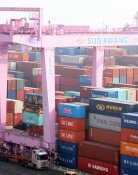China's ‘second opening' declaration
China's ‘second opening' declaration
Posted November. 07, 2018 07:25,
Updated November. 07, 2018 07:25
Chinese President Xi Jinping announced the opening of a massive market worth 1.3 billion won at the opening speech for the 1st China International Import Expo, held in Shanghai on Monday. President Xi announced five measures to expand the market including the expansion of import, alleviation of restrictions upon entry, protection of intellectual property rights, vitalization of free trade experiment district, and the enforcement of multilateral and bilateral cooperation. He also revealed that he will increase the import of product and services to 40 trillion dollars for the next fifteen years, which is 1.5 times higher than the import amount for the past 15 years.
With the 40th anniversary of China’s adoption of innovation and market opening ahead next month, this Import Expo is a message that China will lead its second innovation and market opening with large-scale expansion of imports. Moreover, this is also an effort to alleviate the trade war attacks by the Trump administration. The Chinese president, however, said that he would not engage in one-sided concession and urged that “each state needs to oppose protectionism and unilateralism with clear banner.”
Even up until now, Xi regarded himself as a global leader who opposes protectionism in various international venues and leads free trade. It is, however, doubtful whether China is qualified to do so as it was frequently involved irrational acts that politically weaponized the strong trade dominance. A case in point is its THAAD retaliation against Korea. Various unjust measures such as the Chinese government’s act of encouraging boycott, hit Korean companies hard. This is not the case in Korea alone. China not only regulated the import of Norwegian salmons when a Chinese won the Nobel peace award but also halted the import of Philippine bananas when it was under territorial disputes in relation to the South China Sea.
No matter how wide China opens up its market and abolishes investment barriers, no one would feel secure to enter the Chinese market, which has no system of trust that can sustain trade and investment. Even though President Xi announced that he would severely punish violation of intellectual property rights, it will only end in empty talks unless fundamental innovation is made to the Chinese market, which is filled with piracy, fake products, and hacking. Moreover, unless the Chinese leadership’s thoughts, which political problems can be solved with economic retaliation, is changed, any promise of opening up its market will only seem to be a will to increase its economic clout against other countries by increasing the amount of import in each country.







